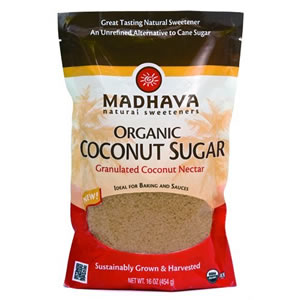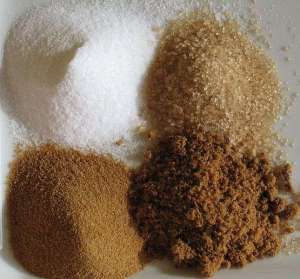Tags
When we decided to clean up our diet, I knew I would need to find a sugar substitute/replacement. I did not want to replace refined white sugar with something equally bad though! So, started my “sugar research”.
What I came to understand, was that the glycemic index of food, and especially sugar, is very important. Several studies I’ve read online show that foods with a low glycemic index satisfy hunger longer and minimize food cravings better. Hmmmm, good for me (and you!) to know!
What is the Glycemic Index?
(this gets a little technical, stay with me!)
The Glycemic Index (GI) is a measure of the effects of carbohydrates on blood sugar levels. Carbohydrates that break down quickly during digestion and release glucose (sugar) rapidly into the bloodstream have a high GI; carbohydrates that break down more slowly, releasing glucose more gradually into the bloodstream, have a low GI. (source: Wikipedia)
With all that very scientific info in mind, I realized that I was literally killing myself with constant blood sugar spikes! Not just from sugar, but from lots of high GI foods.
Enter my new best friend. Coconut Sugar!
 (and this is the exact brand I buy!)
(and this is the exact brand I buy!)
Why I {heart} it
- Coconut Sugar can be substituted cup for cup in all baking/cooking recipes
- It is very low on the glycemic index
- It has LOADS more vitamins and minerals than white sugar
- It is an all natural sweetener that has not been processed or refined
- It doesn’t tastes overpoweringly sweet like traditional white/brown sugar
- Contrary to it’s name, there is no coconut taste 🙂
To give you a visual on the vitamin benefits, compare coconut sugar to the stuff most of us use:
| Macro-nutrients (mg / l – ppm, dry) | Coconut Sugar | Brown Sugar | Refined White Sugar |
|---|---|---|---|
| Nitrogen (N) | 2020 | 100 | 0 |
| Phosphorus (P) | 790 | 30 | 0.7 |
| Potassium (K) | 10,300 | 650 | 25 |
| Calcium (Ca) | 60 | 240 | 60 |
| Magnesium (Mg) | 290 | 70 | 10 |
| Sodium (Na) | 450 | 20 | 10 |
| Chlorine (Cl) | 4700 | 180 | 100 |
| Sulfur (S) | 260 | 130 | 20 |
| Boron (B) | 6 | 0 | 0 |
| Zinc (Zn) | 21 | 2 | 1.2 |
| Manganese (Mn) | 1 | 2 | 0 |
| Iron (Fe) | 22 | 0.6 | 0.6 |
| Copper (Cu) | 2 | 12.6 | 1.2 |
|
Source: COMPARISON OF THE ELEMENTAL CONTENT OF 3 SOURCES OF EDIBLE SUGAR – Analyzed by PCA-TAL, Sept. 11, 2000. (MI Secretaria et al., 2003) in parts per million (ppm or mg/li) |
|||
Are you convinced yet?
Keep in mind that coconut sugar, like ANY sugar, is to be eaten in moderation. As in, on special occasions. We’ve been limiting our “sugar using” to the weekends when we bake cookies. Combine that with cutting out all foods with white sugar in them, and processed foods in general, and we are feeling pretty good around here!
Here another little chart to help you visualize low GI sugars, and the particularly high GI sugars:
|
Artificial Sweeteners
|
N/A
|
Never a Healthy Sugar Alternative All artificial chemical sweeteners are toxic and can indirectly lead to weight gain, the very reason many people consume them. They should be avoided. In fact, given a choice between high fructose corn syrup and artificial sweeteners, we recommend high fructose corn syrup by far (though it’s essentially asking if you should consume poison or worse poison). |
|
Agave Nectar
|
15-30
|
A sweet syrup made from the Blue Agave plant, Agave Nectar is obtained by the extraction and purification of “sap” from the agave plant, which is broken down by natural enzymes into the monosaccharides (simple sugars): mainly fructose (70-75%) and dextrose (20-26%). Read more about agave nectar at OLM. |
|
Fructose
|
17
|
Though fructose has a low glycemic index rating, fructose consumption should be limited. It is devoid of nutrition. |
|
Raw Honey
|
30
|
A Healthy Sugar Alternative in moderation With antioxidants, minerals, vitamins, amino acids, enzymes, carbohydrates, and phytonutrients, raw, unprocessed honey is considered a superfood by many alternative health care practitioners and a remedy for many health ailments. Choose your honey wisely. There is nothing beneficial about processed honey. Read more about honey at OLM. |
|
Coconut Palm Sugar
|
35
|
Originally made from the sugary sap of the Palmyra palm , the date palm or sugar date palm (Phoenix sylvestris). It’s also made from the sap of coconut palms. With a relatively low glycemic index, Cocnut palm sugar is the new rage among health nuts. It’s often called “coconut nectar sugar” or “coconut sugar”. |
|
Barley Malt Syrup
|
42
|
Barley malt syrup is considered to be one of the healthiest sweeteners in the natural food industry. Barley malt is made by soaking and sprouting barley to make malt, then combining it with more barley and cooking this mixture until the starch is converted to sugar. The mash is then strained and cooked down to syrup or dried into powder. |
|
Sugar Cane Juice
|
43
|
Healthy Sugar Alternative in moderation Sugar cane juice has many nutrients and other beneficial properties and is said by some health practitioners to be almost as medicinal as raw honey. |
|
Organic Sugar
|
47
|
Organic sugar comes from sugar cane grown without the use of chemicals or pesticides. It is usually darker than traditional white sugar because it contains some molasses. (It has not been processed to the degree white sugar is processed). |
|
Maple Syrup
|
54
|
Maple syrup is made by boiling sap collected from natural growth maple trees during March & April. It is refined sap and is therefore processed. It has a high glycemic index, and though it is much more nutritious then refined table sugar and high fructose corn syrup, there are better choices. |
|
Evaporated Cane Juice
|
55
|
Evaporated cane juice is often considered unrefined sugar, but juicing is a refining process, and evaporating refines further. Though better than turbinado, cane juice (unevaporated) is a better choice as a sweetener. |
|
Black Strap Molasses
|
55
|
White refined table sugar is sugar cane with all the nutrition taken out. Black strap molasses is all of that nutrition that was taken away. A quality organic (must be organic!) molasses provides iron, calcium, copper, magnesium, phosphorus, potassium and zinc, and is alkalizing to the body. |
|
Raw sugar
|
65
|
Raw sugar is not actually raw sugar. It is processed, though not as refined as common white table sugar. Therefore, given a choice between raw and white, choose raw. There are many different variations of raw sugar with many different names depending on how refined it is. |
|
Cola (and other sodas)
|
70
|
Though cola has a lower GI ranking then some might expect, there are many other reasons to avoid cola, or any type of soda. There is nothing beneficial to the human body inside a can of soda (not to mention we should avoid drinking out of aluminum cans!). |
|
Corn Syrup
|
75
|
Corn syrup has very little nutrition and should be avoided. |
|
Refined, Pasteurized Honey
|
75
|
The nutrition is gone, and there is often high fructose corn syrup added to processed honey. Refined pasteurized honey is no better than white table sugar. |
|
Refined Table Sugar
|
80
|
Conventionally grown, chemically processed, and striped of all beneficial properties, many health advocates believe that refined sugar is one of the two leading causes (high fructose corn syrup is the other) of nearly every health ailment known to man (or woman or child). Not only does it have a high GI ranking, but it also is extremely acidic to the body causing calcium and other mineral depletion from bones and organs (sugar is alkaline but has a very acidic effect on the body). |
|
High Fructose Corn Syrup
|
87
|
Many health advocates believe that high fructose corn syrup and refined sugar are the two biggest contributors to health ailments in our society. High fructose corn syrup is a combination of sucrose and fructose. |
|
Glucose (AKA Dextrose)
|
100
|
White bread was the benchmark, but for consistency glucose now holds the rating at 100. |
|
Maltodextrin
|
150
|
Foods that have maltodextrin often say “Low Sugar” or “Complex Carbohydrate”, but this sweetener should be avoided! |
This chart gives you an idea of the work your body is going through to process all that sugar!
Here’s a challenge: Go to your pantry, and start reading ALL the labels on your food. How many have one of the sugars listed above? Even in products you wouldn’t expect there to be sugar? Start educating yourself about just how much sugar you and your family are consuming. I promise you will be surprised!
If you are thinking about going clean, take the plunge, and switch to coconut sugar!


Pingback: Weekly Meal Plan Aug 6th-Aug 10th «
Pingback: {Clean} Chewy Oatmeal Raisin Cookies «
Pingback: Black Bean & Tomato Quinoa «
Pingback: {Clean} Green Bean Stir Fry «
Pingback: How to Make Powdered Coconut Sugar «
I agree. Anything that is potentially bad such as sugar should be taken in moderation.
Here’s to your Health!
Pingback: Clean Eating {Pumpkin} Chocolate Chip Cookies «
How about adding Steviato your list? It’s another sugar “substitute” that provides no caloric intake while satisfying the craving for sweet flavour and has no (reported) ill effects as well as having been used in Brazil and Japan for decades.
Sorry, should have posted as “Stevia to…”
Pingback: {Pumpkin} Streusel Pancakes «
Pingback: Happy Thanksgiving! «
Pingback: {Sunday} Cinnamon Rolls «
Pingback: {Clean Eating} Where we are now |
So, what is your take on Agave Nectar? It looks like it has a low GI index, but it is full of simple sugars? One of which is dextrose, which says we should avoid. Thoughts?